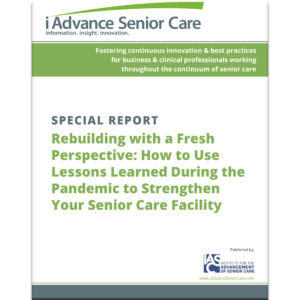What New Vaccination Recommendations Mean for the Upcoming Flu Season

Dr. Gregg Sylvester, chief health officer at CSL Seqirus
Since senior care organizations care for a vulnerable population, flu season is an annual concern. While many organizations likely already have vaccination plans in place, new vaccination recommendations paired with what is predicted to be a harsh flu season mean it’s time to revise what’s been done in the past.
Preventing the Flu in Senior Care Settings
Dr. Gregg Sylvester, chief health officer at CSL Seqirus, explains that in addition to children, older adults are highly susceptible to the flu. “The data is clear that 80% of the flu-related deaths that occur in the United States occur in adults age 65 and up,” he says. “And 50 to 70% of hospitalizations are of those age 65 and up. There are plenty of risk factors for those that live in residential senior care.”
Further complicating those risk factors is the presence of COVID-19. Dr. Sylvester explains that, because COVID-19 and the flu have similar symptoms, telling the two diseases apart requires testing. Fortunately, the same types of precautions work for both illnesses. If a resident is sick, regardless of whether they may have the flu or COVID-19, they should be separated from the rest of the population to help keep the virus from spreading.
Implementing flu (and COVID-19) prevention techniques can help to prevent transmission within senior care organizations. “Some of the same things we did for the pandemic were actually designed for flu pandemics,” explains Dr. Sylvester. He notes that it’s important to have staff and residents wash their hands frequently and follow the practice of sneezing into an elbow instead of a hand. Staff should stay home if they don’t feel well.
Senior care organizations may also want to require visitors to wear masks, at least during the winter months. “With the flu on the rise and COVID-19 still out there, I think that would be a good precaution,” says Dr. Sylvester. Organizations should also decide whether residents and staff should also wear masks.
New Recommendations for the Flu Vaccine
Ensuring that senior care residents and staff are vaccinated for the flu is also a key element in preventing its spread. Dr. Sylvester notes that senior care organizations should be aware of this year’s new flu vaccine recommendations.
“We have two bodies in the United States,” he explains. “One is a regulatory body, the FDA. For vaccines, there’s a second recommending body – the Advisory Committee on Immunization Practices (ACIP).” In June 2022, the ACIP recommended that adults age 65 and older receive one of three specific influenza vaccines:
- Quadrivalent high-dose inactivated influenza vaccine (HD-IIV4)
- Quadrivalent recombinant influenza vaccine (RIV4)
- Quadrivalent adjuvanted inactivated influenza vaccine (aIIV4)
Dr. Sylvester explains that these specific vaccinations are recommended because they are likely a better choice for adults age 65 and up than the standard flu vaccine. The adjuvanted vaccine is designed to “rev up” the immune system and call it to the injection site. The high-dose and recombinant vaccines have more antigens in them than the standard flu vaccine. “If these three vaccines are available, they ought to be offered to adults age 65 and up,” he says. “If they are not available, then adults should still get a regular flu vaccine.”
Implementing a comprehensive flu vaccination program is key to flu prevention in senior care settings, and it’s important to encourage residents and staff to get vaccinated. Dr. Sylvester notes that the idea that people can contract the flu from a vaccine is a misconception. “All flu vaccines that are in this age group are inactivated,” he explains. “You can’t get the flu from the vaccine.” However, because the vaccine tricks the immune system into thinking the vaccine is a real virus, it can mimic the flu at a much lower level. It’s possible to experience mild symptoms, like a headache or lethargy, which occur as the immune system tries to fight off the vaccine and mounts an immune response.
The 2022 Flu Season
Now is the time to prepare for the flu season, particularly since the 2022 season may be a harsh one. “We saw a fairly severe high rate of flu in the Southern hemisphere in their current flu season, which is ending now,” says Dr. Sylvester. “We found it was more severe and it started sooner than it normally does. The Southern hemisphere is typically a canary in the coal mine, and helps to predict what will happen in the Northern hemisphere. I think we’re set up for a serious flu season this year.”
The CDC also has a surveillance system, and that system is already showing an uptick in moderate to high levels of a flu-like illness in Georgia, Texas, and Washington, D.C. “I think we’re starting to see it early.”

Paige Cerulli is a contributing writer to i Advance Senior Care.
Related Articles
Topics: Featured Articles , Infection control , Risk Management










